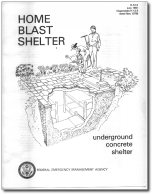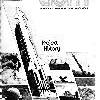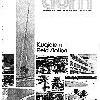Cold War Memorabilia


As children growing up in the 1960s, the threat of nuclear annihilation
was an ever-present fact of life. As a reminder
of those halcyon days, we collect souvenirs of the Cold War.
Above is the Fallout Shelter sign we have in our living room.
 Here is our SK IV Sanitation Kit. It has a plastic toilet seat that
fits on top of the fiber drum to make a dandy fallout shelter
latrine. It has a plastic bag for a liner, chemicals so it won't
smell too much, and many, many rolls of flimsy government-issue
toilet paper. It is supposed to provide for 50 people for two
weeks. We've often wondered if they took into account that
radiation poisoning causes diarrhea.
Here is our SK IV Sanitation Kit. It has a plastic toilet seat that
fits on top of the fiber drum to make a dandy fallout shelter
latrine. It has a plastic bag for a liner, chemicals so it won't
smell too much, and many, many rolls of flimsy government-issue
toilet paper. It is supposed to provide for 50 people for two
weeks. We've often wondered if they took into account that
radiation poisoning causes diarrhea.
In any event, we always figured that this item would be a good thing
to have around for when we have The Big One on the San Andreas,
and the major aqueducts into Los Angeles are broken. But we're
not sure we could bring ourselves to actually use it. It's such a
classic piece of Civil Defense memorabilia.
 And for your dining pleasure, we have here 14 pounds of Civil Defense
survival biscuits. Yum. The can says there are 89 biscuits per
pound, and a minimum of 1246 in the can.
And for your dining pleasure, we have here 14 pounds of Civil Defense
survival biscuits. Yum. The can says there are 89 biscuits per
pound, and a minimum of 1246 in the can.
And in case you're wondering, the can opener is part of the SK IV
sanitation kit.
 Here are some Civil Defense emergency water rations to wash those biscuits
down. We were not aware that there was a Mil Spec for water, but
apparently there is. The cans reference spec MIL-W-15117B.
Here are some Civil Defense emergency water rations to wash those biscuits
down. We were not aware that there was a Mil Spec for water, but
apparently there is. The cans reference spec MIL-W-15117B.
 This is a booklet published in 1960. It is a set of reprints of newspaper articles from the late '50s. It sets out an optimistic view of how to survive a nuclear holocaust. Yup. The best bit: "Of course, even if you lived safely through the H-bomb attack... your troubles would just be beginning."
This is a booklet published in 1960. It is a set of reprints of newspaper articles from the late '50s. It sets out an optimistic view of how to survive a nuclear holocaust. Yup. The best bit: "Of course, even if you lived safely through the H-bomb attack... your troubles would just be beginning."
 Here from 1958, we have "Facts About Fallout". I love the font on this one. Remember, "Your family's favorite canned foods can be a morale lifter" while you're hunkered down in your shelter after getting nuked.
Here from 1958, we have "Facts About Fallout". I love the font on this one. Remember, "Your family's favorite canned foods can be a morale lifter" while you're hunkered down in your shelter after getting nuked.
 Here's a 1961 booklet on exercises you and your family can do at home to prepare for nuclear holocaust.
Here's a 1961 booklet on exercises you and your family can do at home to prepare for nuclear holocaust.
 Be the first on your block! Here are plans for a basement snack
bar/fallout shelter that you can build yourself.
Note that in the instructions, they say that in time of crisis
you can just fill it with bricks and it's ready to use. We did a
quick estimate, and filling the thing would require about 3,200
pounds (1450kg) of bricks. How fast can you move this many
bricks? Could you do it in the 30 minutes it takes an ICBM to
reach its target?
Be the first on your block! Here are plans for a basement snack
bar/fallout shelter that you can build yourself.
Note that in the instructions, they say that in time of crisis
you can just fill it with bricks and it's ready to use. We did a
quick estimate, and filling the thing would require about 3,200
pounds (1450kg) of bricks. How fast can you move this many
bricks? Could you do it in the 30 minutes it takes an ICBM to
reach its target?
| Page 1 | Introduction |
| Page 2 | Drawings |
| Page 3 | Materials List |
| Page 4 | Instructions |
 And here we have plans for your own home bunker and blast shelter.
And here we have plans for your own home bunker and blast shelter.
| Page 1 | Cover Page |
| Page 2 | Information |
| Page 3 | More Information |
| Page 4 | Ventilation |
| Page 5 | Options |
| Page 6 | Plans |
| Page 7 | Plans |
| Page 8 | Plans and Notes |
 ABM Project
History
ABM Project
History
 Kwajalein Field Station History
Kwajalein Field Station History